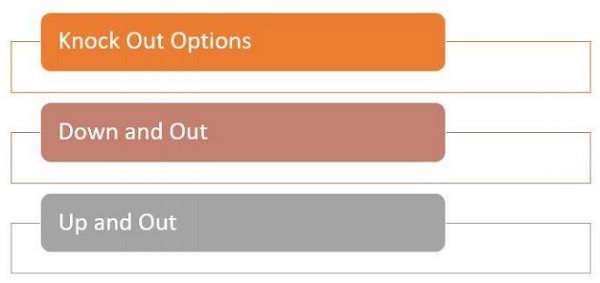
 Data Structure
Data Structure Networking
Networking RDBMS
RDBMS Operating System
Operating System Java
Java MS Excel
MS Excel iOS
iOS HTML
HTML CSS
CSS Android
Android Python
Python C Programming
C Programming C++
C++ C#
C# MongoDB
MongoDB MySQL
MySQL Javascript
Javascript PHP
PHP
- Selected Reading
- UPSC IAS Exams Notes
- Developer's Best Practices
- Questions and Answers
- Effective Resume Writing
- HR Interview Questions
- Computer Glossary
- Who is Who
What is Knock-Out Option and How Does It Work?
A knock-out option is an option that has a built-in mechanism that will cause it to expire worthless if a predetermined price level in the underlying asset is achieved before the option has expired. A knock-out option places a limit on the amount of money that may be made by the option holder if the option is successful.
The lower market value for the option buyer means that knock-out options may be bought for a lower premium than an identical option that does not include a knock-out condition.
Types of Knock Out Options

Key Points Briefly
Breakout options are a kind of knock-out option in which the underlying asset's price falls below or rises over a predetermined price at the time the option expires worthless.
Knock-out alternatives are divided into two categories − up-and-out barrier choices and down-and-out barrier options.
Knock-out options not only restrict losses, but they also the possibly for gains.
Knock-Out Options Come in a Variety of Forms
- The Down-and-Out Knock-Out Alternative
A down-and-out alternative is a kind of knock-out option that provides the option holder with the right to purchase or sell the underlying asset in the agreed term at the striking price of the option contract. If the asset's price does not fall below a specific price stated in the contract, this is considered legitimate. This price is known as the barrier price.
Alternatively, if the asset's price does hit the barrier price and subsequently falls below it, the option agreements will be deemed worthless, and the trade will be considered completed.
- Up-and-Out Knock-Out As An Alternative
When the asset's price does not rise beyond a certain threshold, an up-and-out option, which is a kind of knock-out option, provides the option holder with the right to purchase or sell the underlying asset in the options contract at a predetermined price.
Consequently, the asset may be purchased or sold at the strike price in this situation. If, on the other hand, the asset's price rises over the barrier price, the options contract will be deemed worthless and will be knocked out as well.
Knock-Out Option Example
Let us take the example where the buyer has purchased a knock-out contract of $70 barrier price. This has a strike price of lets say $80, and the price of the asset would be $90. In a scenario where the asset price never reduces to $70 of barrier price, the shareholder gets the payout.
This condition would not be valid if the price of the price of the asset reduced below the barrier price. Once that happens, this options contract would terminate and there would be no contract.
Similarly for the up-and -out option if the price of the asset were never to exceed the barrier price, the contract agreement would be considered valid and would be fulfilled until the term date. If the asset price exceeds the barrier price, the contract gets “knocked out”.

